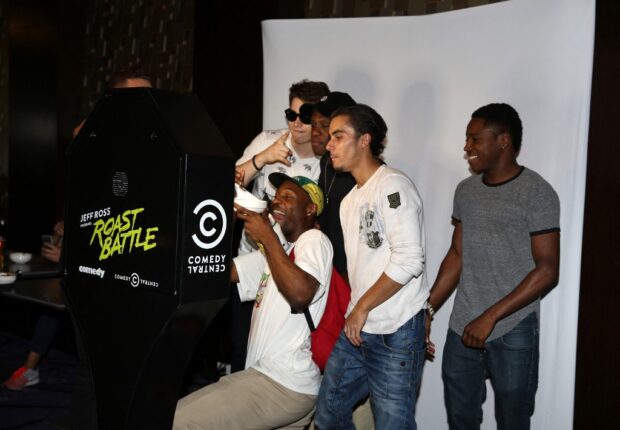
Guests and comedians attend “Comedy Central ‘Roast Battle’ Launch Party” on July 28, 2016, in Montreal, Canada. Home to a prestigious comedy school, the world’s largest annual laughs festival and nightclubs that pack in audiences for dozens of weekly stand-up shows, comedy is serious business in Montreal. RAFFI KIRDI / Getty Images via AFP
MONTREAL, Canada—Home to a prestigious comedy school, the world’s largest annual laughs festival and nightclubs that pack in audiences for dozens of weekly stand-up shows, comedy is serious business in Montreal.
Hundreds of comedians regularly ply their trade in the French-speaking Canadian city after the number of local stages offering to showcase their talents exploded in recent years.
Improv, topical, observational or deadpan comedy in both French and English, from pioneers such as Tom Green—host of a popular MTV show in the 1990s—to newbies trying to find what works on stage, every stand-up style imaginable can be found.
Appreciative audiences fill the brisk Quebec night air with laughter, in a province in which comedy shows are a top entertainment draw.
“Comedy in Quebec, we take it seriously,” said comedian Simon Delisle.
At the popular Bordel Comedy Club in Montreal, Charles Deschamps—with a microphone in hand and a staid brick wall as a backdrop—lets loose on a packed room with joke after joke, eliciting giggles and guffaws from the audience.
Opened in 2015, the comedy cabaret presents several shows a night—and usually sells out even before the lineup is finalized, said Deschamps, who is also part-owner of the club.
Building on its runaway success, the cabaret doubled its capacity by opening a second stage last year and expanded its bookings.
“It’s a way to relax,” says a grinning Manuel St-Aubin, 27, a regular at the club.
At the Bordel, “the laughter is loud, people applaud a lot,” observes Certe Mathurin, contrasting Canadians’ outbursts with more muted Paris audiences.
The French comedian plans to start his fourth comedy tour in Quebec, calling the Canadian province—which has hosted Just for Laughs, the largest international comedy festival in the world, for decades—”the Mecca of humor.”
“It’s a pilgrimage for comedians: whether you’re French, Swiss, Belgian… you have to go to Quebec because they are at the forefront of French-speaking humor,” adds the 37-year-old.
What’s so funny
Before performing on stage, many seek training at the National School of Humor in Montreal.
Founded in 1988, the school graduates about 30 comedians each year, including Roman Frayssinet who went on to great success in France—which current student Felix Wagner, 27, hopes to emulate.
Inside a classroom with curtains drawn, one of Wagner’s schoolmates rehearses a comedy routine. His teacher, Stephan Allard, tells him he needs to “work on the material so that it flows better.”
There are also lessons in creativity, improvisation, and career management, and each week students are required to present in class a new five-minute stand-up routine.
Allard says they help students locate their funny bone—whether they mine their own lives for inspiration, or find their material in news or pop culture—and zero in on which bits “are funniest on stage.”
The program also helps them firm up their writing and to develop a “signature” style to differentiate themselves from others, he added.
“Going to the school allowed me to perform in comedy clubs in Paris, even though they didn’t know me, in places where it’s normally difficult to get a gig,” such as the Paname or Fridge comedy clubs, said Virginie Courtiol, a first-year student who uses the alias “Beurguy” onstage.
The 34-year-old French comedian riffs on topics such as menstruation and having had an abortion.
Once that kind of humor about women’s bodies would have been taboo—but as Deschamps says, “there is always an evolution.” /ra
RELATED STORIES:
Comedy series on Filipino immigrant life debuts on Canadian TV
Filming begins for Canadian comedy TV series in English and Tagalog